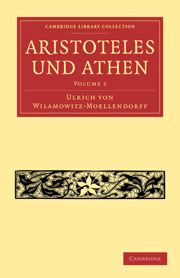Book contents
- Frontmatter
- Contents
- ZWEITES BUCH. Untersuchungen auf grund der aristotelischen Politie
- DRITTES BUCH. Beilagen
- 1 Die phratrie der Demotioniden
- 2 Der erste krieg mit Aegina
- 3 Die chronologie der pentekontaetie
- 4 Solons gedichte
- 5 Die attische skoliensammlung
- 6 Pindaros siebentes pythisches gedicht
- 7 Der process der Eumeniden
- 8 Die zeit der Thesmophoriazusen
- 9 Die rede für Polystratos
- 10 Die paragraphe und Lysias wider Pankleon
- 11 Lysias wider die kornhändler
- 12 Isokrates Panegyrikos 100–114
- 13 Die briefe des Isokrates
- 14 Demosthenes prooemium 55
- 15 Die gedichte des Aristoteles
- Sachregister
13 - Die briefe des Isokrates
Published online by Cambridge University Press: 10 November 2010
- Frontmatter
- Contents
- ZWEITES BUCH. Untersuchungen auf grund der aristotelischen Politie
- DRITTES BUCH. Beilagen
- 1 Die phratrie der Demotioniden
- 2 Der erste krieg mit Aegina
- 3 Die chronologie der pentekontaetie
- 4 Solons gedichte
- 5 Die attische skoliensammlung
- 6 Pindaros siebentes pythisches gedicht
- 7 Der process der Eumeniden
- 8 Die zeit der Thesmophoriazusen
- 9 Die rede für Polystratos
- 10 Die paragraphe und Lysias wider Pankleon
- 11 Lysias wider die kornhändler
- 12 Isokrates Panegyrikos 100–114
- 13 Die briefe des Isokrates
- 14 Demosthenes prooemium 55
- 15 Die gedichte des Aristoteles
- Sachregister
Summary
Auf die stimmung, die jeden griechischen brief unbesehens verwarf, ist die entgegengesetzte gefolgt; es ist das jedoch kein fortschritt, denn stimmungen genügen für die wissenschaft nicht. ich brauchte für den prinzenerzieher Aristoteles den fünften brief, wenn er ächt war: deshalb habe ich die sache untersucht, und gerade weil das ergebnis kein einfaches ja oder nein ist, halte ich es für richtig.
Der brief an Dionysios (1) ist durch die rede an Philippos (5,81) so sicher bezeugt, dass man, urn ihn zu verwerfen, die absicht eines fälschers wahrscheinlich machen müsste, der auf grund jener stelle einen brief verfertigt hätte. das ist nicht möglich. es kommt hinzu, dass der brief nur ein sehr schön geschriebenes prooemium enthält, das eine wichtige politische erörterung verspricht. diese zu unterdrücken konnte Isokrates alle veranlassung haben, wenn die politischen ereignisse eine fur ihn unerwünschte wendung genommen hatten, und der sicilische fürst mit der entgegengesetzten politik erfolgreich gewesen war: der fälscher hätte bequem ex eventu schreiben können was ihm passte. der brief nimmt auch auf den Panegyrikos in durchaus angemessener weise bezug (6), etwa wie die rede an Philippos, und wenn die nachteile des briefes gegenüber dem gespräche so behandelt werden (3), dass man die nachwirkung der schönen platonischen kritik (Phaidr. 275) spürt, so spricht das vollends für den verfasser, der trotz aller späteren entfremdung den Phaidros zu viel und zu gerne gelesen hatte, um ihn je zu vergessen.
- Type
- Chapter
- Information
- Aristoteles und Athen , pp. 391 - 399Publisher: Cambridge University PressPrint publication year: 2010



